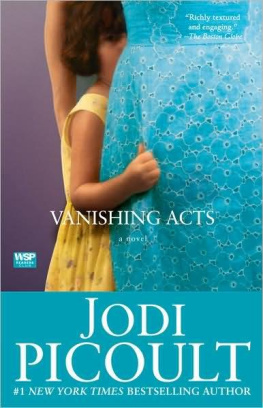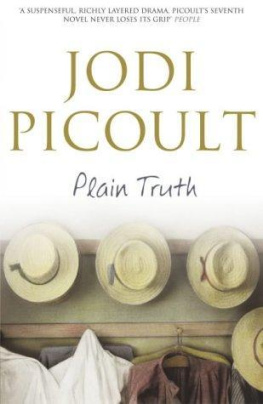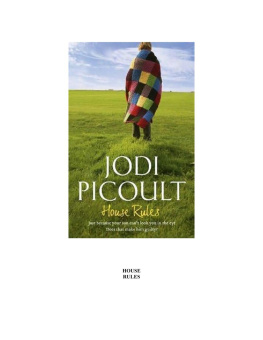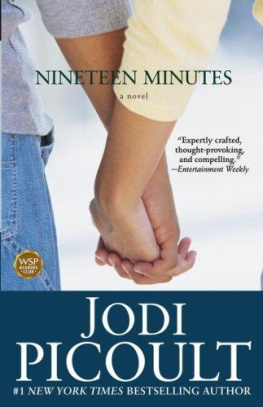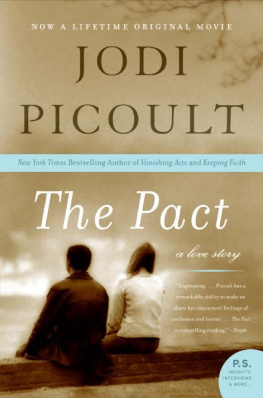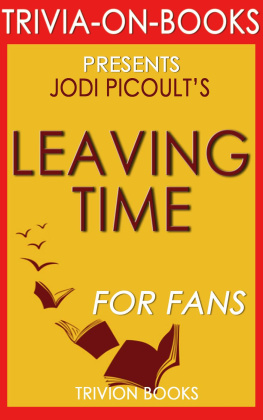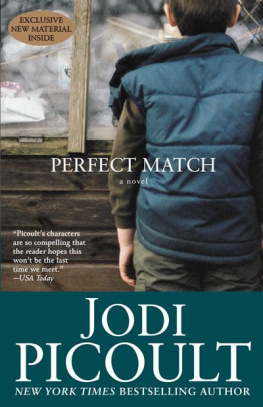Jodi Picoult - Vanishing Acts
Here you can read online Jodi Picoult - Vanishing Acts full text of the book (entire story) in english for free. Download pdf and epub, get meaning, cover and reviews about this ebook. genre: Detective and thriller. Description of the work, (preface) as well as reviews are available. Best literature library LitArk.com created for fans of good reading and offers a wide selection of genres:
Romance novel
Science fiction
Adventure
Detective
Science
History
Home and family
Prose
Art
Politics
Computer
Non-fiction
Religion
Business
Children
Humor
Choose a favorite category and find really read worthwhile books. Enjoy immersion in the world of imagination, feel the emotions of the characters or learn something new for yourself, make an fascinating discovery.
- Book:Vanishing Acts
- Author:
- Genre:
- Rating:4 / 5
- Favourites:Add to favourites
- Your mark:
- 80
- 1
- 2
- 3
- 4
- 5
Vanishing Acts: summary, description and annotation
We offer to read an annotation, description, summary or preface (depends on what the author of the book "Vanishing Acts" wrote himself). If you haven't found the necessary information about the book — write in the comments, we will try to find it.
Vanishing Acts — read online for free the complete book (whole text) full work
Below is the text of the book, divided by pages. System saving the place of the last page read, allows you to conveniently read the book "Vanishing Acts" online for free, without having to search again every time where you left off. Put a bookmark, and you can go to the page where you finished reading at any time.
Font size:
Interval:
Bookmark:
Vanishing Acts
Prologue
I was six years old the first time I disappeared.
My father was working on a magic act for the annual Christmas show at the senior center, and his assistant, the receptionist who had a real gold tooth and false eyelashes as thick as spiders, got the flu. I was fully prepared to beg my father to be part of the act, but he asked, as if I were the one who would be doing him a favor.
Like I said, I was six, and I still believed that my father truly could pull coins out of my ear and find a bouquet of flowers in the folds of Mrs. Kleban's chenille housecoat and make Mr. van Looen's false teeth disappear. He did these little tricks all the time for the elderly folks who came to play bingo or do chair aerobics or watch old black-and-white movies with soundtracks that crackled like flame. I knew some parts of the act were fakehis fiddlehead mustache, for example, and the quarter with two headsbut I was one hundred percent sure that his magic wand had the ability to transport me into some limbo zone, until he saw fit to call me back. On the night of the Christmas show, the residents of three different assisted-living communities in our town braved the cold and the snow to be bused to the senior center. They sat in a semicircle watching my father while I waited backstage. When he announced methe Amazing Cordelia!I stepped out wearing the sequined leotard I usually kept in my dress-up bin.
I learned a lot that night. For example, that part of being the magicians assistant means coming face-to-face with illusion. That invisibility is really just knotting your body in a certain way and letting the black curtain fall over you. That people don't vanish into thin air; that when you can't find someone, it's because you've been misdirected to look elsewhere.
I
I think it is a matter of love: the more you love a memory, the stronger and stranger it is.
Vladimir Nabokov
Delia
You can't exist in this world without leaving a piece of yourself behind. There are concrete paths, like credit card receipts and appointment calendars and promises you've made to others. There are microscopic clues, like fingerprints, that stay invisible unless you know how to look for them. But even in the absence of any of this, there's scent. We live in a cloud that moves with us as we check e-mail and jog and carpool. The whole time, we shed skin cellsforty thousand per minutethat rise on currents up our legs and under our chins.
Today, I'm running behind Greta, who picks up the pace just as we hit the twisted growth at the base of the mountain. I'm soaked to the thighs with muck and slush, although it doesn't seem to be bothering my bloodhound any. The awful conditions that make it so hard to navigate are the same conditions that have preserved this trail.
The officer from the Carroll, New Hampshire, Police Department who is supposed to be accompanying me has fallen behind. He takes one look at the terrain Greta is bulldozing and shakes his head. Forget it, he says. There's no way a four-year-old would have made it through this mess.
The truth is, he's probably right. At this time of the afternoon, as the ground cools down under a setting sun, air currents run downslope, which means that although the girl probably walked through flatter area some distance away, Greta is picking up the scent trail where it's drifted. Greta disagrees, I say. In my line of work, I can't afford not to trust my partner. Fifty percent of a dog's nose is devoted to the sense of smell, compared to only one square inch of mine. So if Greta says that Holly Gardiner wandered out of the playground at Sticks & Stones Day Care and climbed to the top of Mount Deception, I'm going to hike right up there to find her.
Greta yanks on the end of the fifteen-foot leash and hustles at a clip for a few hundred feet. A beautiful bloodhound, she has a black widow's peak, a brown velvet coat, and the gawky body of the girl who watches the dancers from the bleachers. She circles a smooth, bald rock twice; then glances up at me, the folds of her long face deepening. Scent will pool, like the ripples when a stones thrown into a pond. This is where the child stopped to rest.
Find her, I order. Greta casts around to pick up the scent again, and then starts to run. I sprint after the dog, wincing as a branch snaps back against my face and opens a cut over my left eye. We tear through a snarl of vines and burst onto a narrow footpath that opens up into a clearing.
The little girl is sitting on the wet ground, shivering, arms lashed tight over her knees. Just like always, for a moment her face is Sophie's, and I have to keep myself from grabbing her and scaring her half to death. Greta bounds over and jumps up, which is how she knows to identify the person whose scent she took from a fleece hat at the day-care center and followed six miles to this spot. The girl blinks up at us, slowly pecking her way through a shell of fear. I bet you're Holly, I say, crouching beside her. I shrug off my jacket, ripe with body heat, and settle it over her clothespin shoulders. My name is Delia. I whistle, and the dog comes trotting close. This is Greta.
I slip off the harness she wears while she's working. Greta wags her tail so hard that it makes her body a metronome. As the little girl reaches up to pat the dog, I do a quick visual assessment. Are you hurt?
She shakes her head and glances at the cut over my eye. You are. Just then the Carroll police officer bursts into the clearing, panting. I'll be damned, he wheezes. You actually found her. I always do. But it isn't my track record that keeps me in this business. It's not the adrenaline rush; it's not even the potential happy ending. It's because, when you get down to it, I'm the one who's lost.
I watch the reunion between mother and daughter from a distancehow Holly melts into her mother's arms, how relief binds them like a seam. Even if she'd been a different race or dressed like a gypsy, I would have been able to pick this woman out of a crowd: She is the one who seems unraveled, half of a whole. I can't imagine anything more terrifying than losing Sophie. When you're pregnant, you can think of nothing but having your own body to yourself again; yet after giving birth you realize that the biggest part of you is now somehow external, subject to all sorts of dangers and disappearance, so you spend the rest of your life trying to figure out how to keep her close enough for comfort. That's the strange thing about being a mother: Until you have a baby, you don't even realize how much you were missing one.
It doesn't matter if the subject Greta and I are searching for is old, young, male, or femaleto someone, that missing person is what Sophie is to me. Part of my tight connection to Sophie, I know, is pure over-compensation. My mother died when I was three. When I was Sophie's age, I'd hear my father say things like I lost my wife in a car accident, and it made no sense to me: If he knew where she was, why didn't he just go find her? It took me a lifetime to realize things don't get lost if they don't have valueyou don't miss what you don't care aboutbut I was too young to have stored up a cache of memories of my mother. For a long time, all I had of her was a smella mixture of vanilla and apples could bring her back as if she were standing a foot awayand then this disappeared, too. Not even Greta can find someone without that initial clue.
From where she is sitting beside me, Greta nuzzles my forehead, reminding me that I'm bleeding. I wonder if I'll need stitches, if this will launch my father into another tirade about why I should have become something relatively safer, like a bounty hunter or the leader of a bomb squad.
Someone hands me a gauze pad, which I press against the cut above my eye. When I glance up I see it's Fitz, my best friend, who happens to be a reporter for the paper with the largest circulation in our state. What does the other guy look like? he asks.
Font size:
Interval:
Bookmark:
Similar books «Vanishing Acts»
Look at similar books to Vanishing Acts. We have selected literature similar in name and meaning in the hope of providing readers with more options to find new, interesting, not yet read works.
Discussion, reviews of the book Vanishing Acts and just readers' own opinions. Leave your comments, write what you think about the work, its meaning or the main characters. Specify what exactly you liked and what you didn't like, and why you think so.

